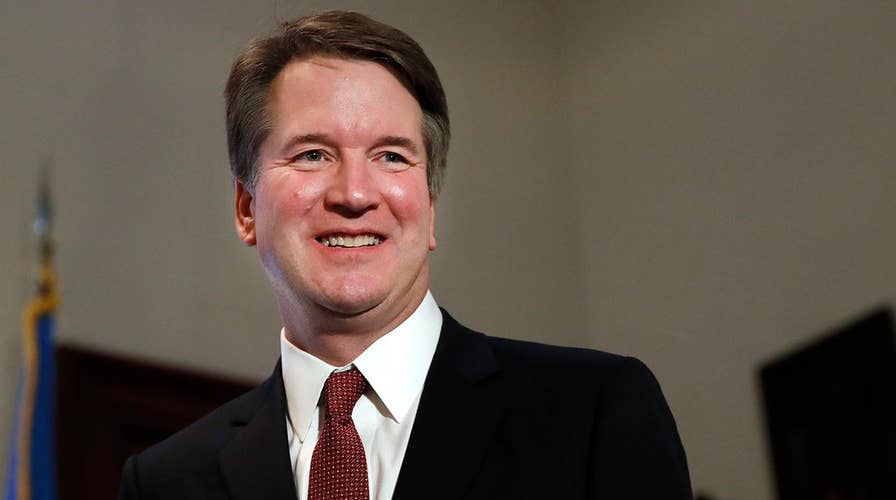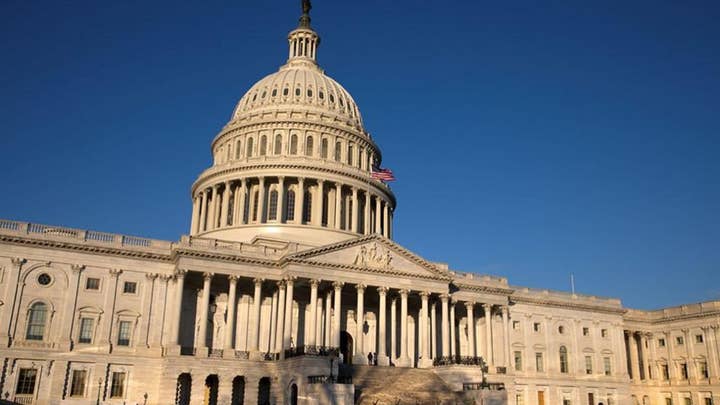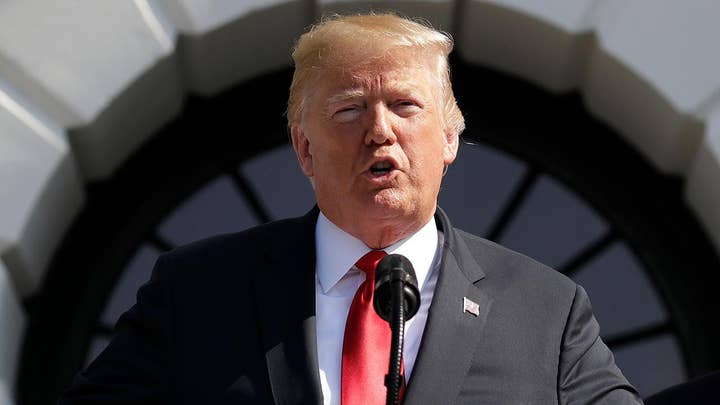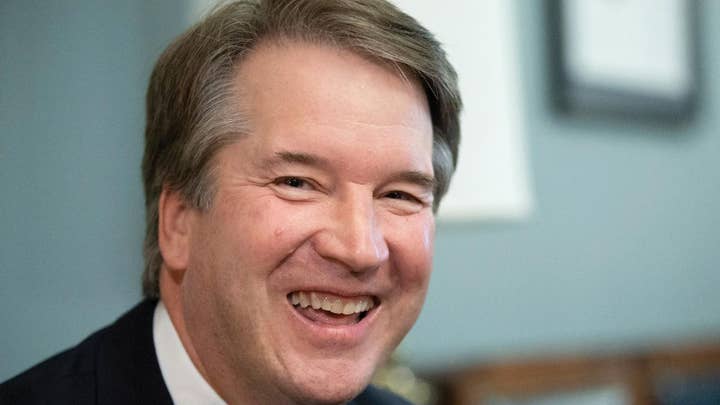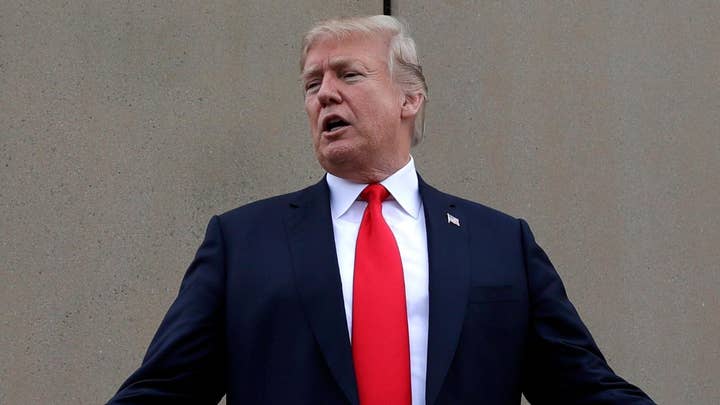Dems accused of playing politics with Kavanaugh nomination
Congressman Ken Buck, Republican member of the House Judiciary Committee, says Democrats don't want to admit that President Trump 'picked a great judge' to replace retiring Supreme Court Justice Kennedy.
Fights over a government shutdown rarely have anything to do with confirming a Supreme Court Justice. But that may not be the case this year.
Government funding expires October 1. That coincides with the start of the Supreme Court’s new term, the fabled “First Monday in October.” Senate Majority Whip John Cornyn, R-Texas, characterized October 1 as a “target” to confirm President Trump’s pick for the high court, Brett Kavanaugh. But Senate Majority Leader Mitch McConnell, R-Ky., gave some wiggle room to that date. The Kentucky Republican suggested last week that the confirmation wouldn't be dragged out “past the first Tuesday in November.”
Two things. It’s believed that it may actually take the Senate a week or two in October to finish the Kavanaugh nomination. Democrats also are yelping for Kavanaugh’s documents. It’s possible Republicans could call the Democrats’ bluff, and drag out the nomination close to the midterms. Such a gambit would tether vulnerable Democratic senators facing challenging reelection campaigns to Washington. That would keep those Democrats off the campaign trail, and maximize focus on how they may vote on Kavanaugh, days before the midterms.
So here’s the problem for Republicans regarding a possible shutdown:
McConnell and House Speaker Paul Ryan, R-Wis., went to the White House last Wednesday to discuss government funding with the president. Fox News is told they emphasized the importance of letting Congress do its work on spending bills this summer and in early fall, and warned the president about the peril of a government shutdown. Fox News is told the leaders thought they had the president in a good place when it came to government funding.
And then Sunday morning hit:
“I would be willing to ‘shut down’ government if the Democrats do not give us the votes for Border Security, which includes the Wall! Must get rid of Lottery, Catch & Release etc. and finally go to system of Immigration based on MERIT! We need great people coming into our Country!” thundered Trump on Twitter.
Fox News is told that House and Senate GOP leaders fully expect there to be hiccups like this one in their effort to avoid a government shutdown on October 1. But they are aware of the grave consequences a shutdown could pose to the Republican Party — especially as they attempt to confirm Kavanaugh.
A couple of scenarios:
Let’s say the Senate is on the fast track, and senators confirm Kavanaugh in late September. Keep in mind that the fight over confirming Kavanaugh is a central part of the strategy for both parties approaching the midterms. His nomination energizes the base on both sides. Republicans would relish a big win just before midterms by confirming Kavanaugh … and then the government shuts down. That’s snatching defeat from the jaws of victory. The story changes immediately, and the GOP receives zero credit for muscling through Kavanaugh.
Now, imagine if Kavanaugh hasn’t been confirmed by October 1, and there’s a government shutdown. In that case, the GOP steps all over its own narrative then about the importance of confirming Kavanaugh.
It’s unclear how long a government shutdown could last. But Fox News is told a shutdown of a week or two could delay the confirmation of Kavanaugh until late October, or even into November. Keep in mind that McConnell said, “There would be any kind of delaying tactic that would take us past the first Tuesday in November.” That’s Election Day. November 6. However, McConnell didn’t consider a “delaying tactic” prompted by the president of the United States.
Multiple Republican sources fear a government shutdown just before the midterms. That said, Fox News is told there are some Republicans on both ends of Pennsylvania Avenue who think a government shutdown standoff over wall-funding and immigration is a fight worth having and, will energize Republicans further to get to the polls.
To wit:
The public largely blamed the GOP for the 17-day government shutdown in the fall of 2013. Yet a year later, Republicans performed well in the 2014 midterms. Voters propelled the GOP to its largest majority since 1928. Republicans wrested control of the Senate from Democrats.
There were two brief shutdowns earlier this year. One lasted a weekend. Another lasted a few hours overnight. Republicans came out well after those battles.
On the first one, Democrats initially went to the mat to secure a DACA deal. But Democrats folded rather quickly. That’s because red state Democratic senators facing challenging reelection bids this fall asked Democratic leaders to call off the dogs. Plus, Trump generally stayed on the sideline for that shutdown. The public pinned that shutdown on the Democrats and not Republicans — despite the GOP controlling the House, Senate and White House.
But a shutdown this fall is different. It would come right before the midterms. It would be different if Trump continues his bravado, molding himself into the architect of the shutdown. Such a scenario could help trigger the “blue wave.” A shutdown may not damage Senate Republicans as much. But this scenario really could have consequences for House Republicans. The more than 40 open seats now held by a Republican would face a particular vulnerability.
There is a scenario where there could be an attempt by a coalition of all Democrats and many Republicans to override a prospective veto of an interim government funding bill to avoid a shutdown.
It takes two-thirds in both bodies to override a veto: 67 in the Senate and 290 in the House. Of course, there would be a lot of Republicans who don’t want to go against the president, and see a fight over the wall as “good politics” just before the midterms. But many don’t see it that way. If the Democrats stick together, it would take 17 Republicans in the Senate and 100 Republicans in the House. Attaining those are numbers would be very likely under these circumstances, and would represent the first major rebuke of Trump by the Republican Congress.
Trump has not vetoed a bill, and thus has yet to face a serious override threat.
Senate Appropriations Committee Chairman Richard Shelby, R-Ala., told Fox News he doesn’t like the idea of an interim spending bill, and the government would “lurch from week to week. Month to month.”
He added: “It behooves both sides to keep the government open.”
House and Senate Republicans are trying to make a good case to Trump not to force a shutdown. McConnell’s philosophy is to show the president how much “progress” Republicans are making on Capitol Hill. They’re about to deliver him a second Supreme Court justice. Had McConnell not established Senate precedent to lower the bar to overcome filibusters of Supreme Court justices, Justice Neil Gorsuch and Kavanaugh likely would be toast. Both would have faced an insurmountable Democratic filibuster. Moreover, the House and Senate are really moving when it comes to appropriations bills, and are on track to move the most spending bills on schedule for the first time in two decades.
This accelerated pace is a byproduct of Trump threatening to veto the gigantic, $1.3 omnibus spending bill back in March. That bill funded the government through September 30, and mixed all 12 spending bills that run the federal government into an onerous legislative fur ball.
“I say Congress, I will never sign another bill like this again,” declared the president.
As a result, lawmakers got to work on the spending bills for fiscal year 2019, which begins October 1.
McConnell also took heed of a warning Trump fired over Twitter in May.
“The Senate should get funding done before the August break, or NOT GO HOME. Wall and Border Security should be included. Also waiting for approval of almost 300 nominations, worst in history. Democrats are doing everything possible to obstruct, all they know how to do. STAY!,” tweeted the president.
And so, the Kentucky Republican has cancelled most of the August recess.
“It’s about getting back to a normal appropriations process we haven’t had in 20 years. Passing individual bills which avoid these big omnibus bills at the end of the year. We’re not going to be dysfunctional this year,” said McConnell in an interview last week on WHAS-AM in Louisville.
The last time Congress approved more than one annual appropriations bill on time was in 2005, for fiscal year 2006. So, if the Senate moves these bills, there’s a good chance Congress will have completed three-quarters of the spending bills before the October 1 deadline.
Will there be a shutdown?
“No. That’s not going to happen,” McConnell told WHAS.
But something is missing in that stew of spending bills: the Department of Homeland Security appropriations bill. That measure funds the wall.
McConnell replied “probably not” when asked whether Congress would address that measure before October 1.
Is all of this elbow grease enough for the president? After all, he promised voters the wall. Is passing these spending bills before the deadline enough for Trump, even if he didn’t get the wall funding yet?
Would Trump interpret no wall money before October 1 as a stumble in the playoffs?
So, timing is everything.
Is the President talking about a September showdown or a December showdown?
But one thing’s for sure: most Republicans hope it’s the latter. That’s because they don’t think a fight in September and October ends well for them at the polls, or, for that matter, the nomination of Kavanaugh.








































